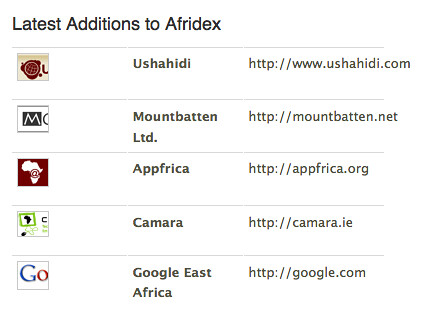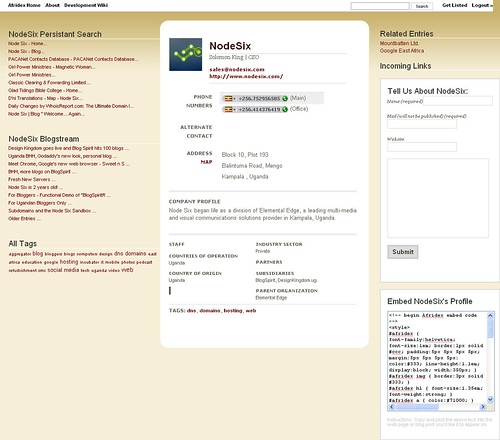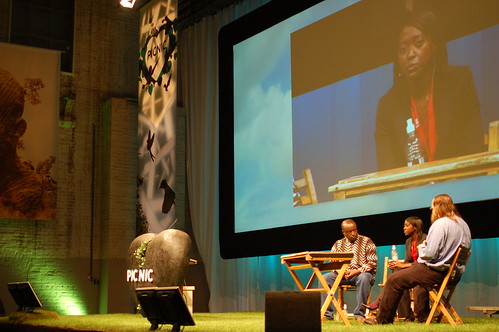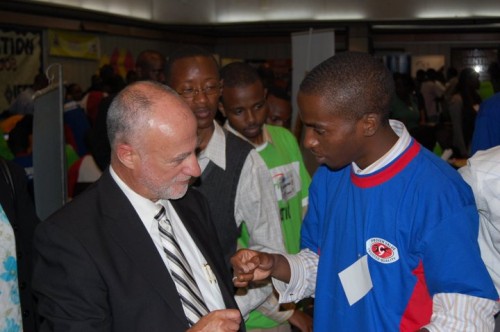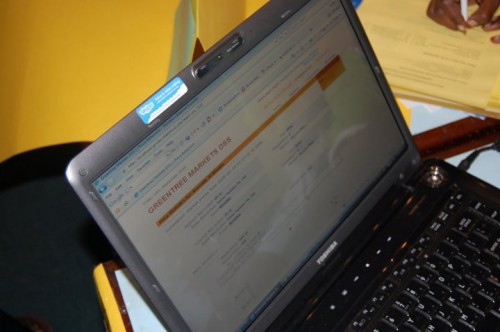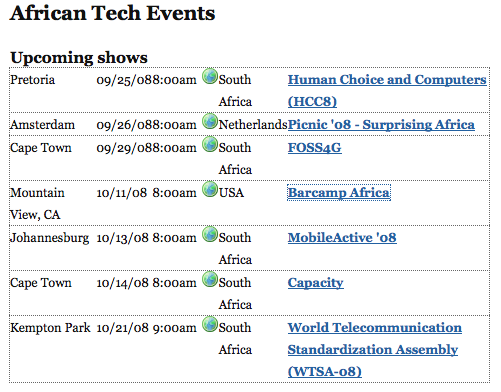(This is from my talk on mobile phones in Africa, at the Picnic conference in Amsterdam this morning.)
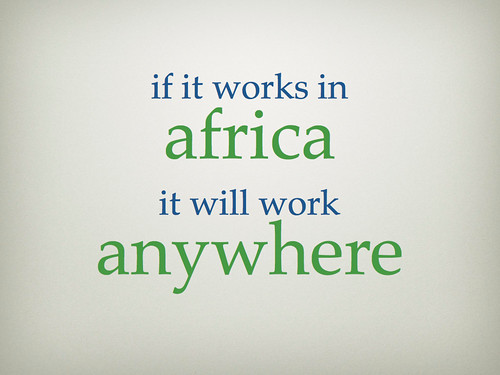
Africa is brimming with innovative people, projects and organizations. The fact that I’m standing here today proves this out – you see, I’ve been writing about those stories for the past 3 years.
Some of you are already familiar with Africa’s mobile stats, but not everyone is. Let’s run through some numbers, and take a minute to really appreciate the staggering growth of just one industry on our continent.
Statistics
- At the end of 2007 there were over 280 million mobile phone subscribers in Africa, representing a penetration rate of 30.4%
- Africa has become the fastest growing mobile market in the world with mobile penetration in the region ranging from 30% to 100%
- Look at the diversity in penetration rates among countries, just in Africa. It’s good to remember that when we speak about “mobile phones in Africa” that not all are created equal.
- Fastest growing markets are in Nigeria, South Africa and Egypt
- Increased competition as more operators come online in each country (11 in Nigeria, 4 in Kenya and SA, 3 in Egypt and Morocco)
- Pre-paid subscriptions account for nearly 95 percent of total mobile subscriptions in the region
How fast has it grown?
- The Democratic Republic of Congo, population 60 million, has 10,000 fixed telephones but more than a million mobile phone subscribers.
- In Chad, the fifth-least developed country, mobile phone usage jumped from 10,000 to 200,000 in three years.
What sectors does this touch? All, of course, but mobile’s have proven especially effective in:Transport, Micro-commerce, Finance, Healthcare, Governance, Education, Infotainment
Examples of innovative services
Mobile payments and mobile banking
- MPESA – This is what happens when the rest of the world ignores your need for a payment system. One of the golden children of Africa’s mobile revolution, when anyone brings up a successful mobile service in Africa. It works, and we’re all extremely happy to have the idea of mobile micro payments piloted and tested by Safaricom, but it also promotes a carrier monopoly in an industry AND continent that is crying for a real payment solution.
- Wizzit – Mobile banking in South Africa
- Celpay – Zambia – An innovative payment solution that allows consumers and businesses to complete cash transactions from their mobile phones. CelPay eliminates the problems that accompany dealing in cash visits to the bank, waiting in lines, counting and recounting money, fear of theft, and forgone interest payments. Instead, consumers with CelPay can use their mobile phone to do anything they would with cash, thanks to a payment system that works like a bank account.
Africa News Mobile Reporters
The Dutch group behind Africanews.com has put together a fleet of reporters around Africa using high end mobile phones, equipped with video and camera, to report short interviews and events from the field. Nokia/Reuter’s mobile newskit – Nokia N71
Ushahidi – Citizen reporting during a crisis (now an open source project).
mPedigree
Ashifi Gogo created a way to use SMS to authenticate drugs in Ghana, a system that simplifies and decreases the cost of doing this and that can be replicated anywhere in the world.
Winafrique’s Wind-powered cellular towers
Hybrid wind and diesel turbine systems for powering cell phone base stations.
Agricultural markets
Tradenet
A free service for farmers in West Africa to see local agricultural market prices around their region. It enables farmers and traders in agricultural commodities in Africa to conduct business through the use of SMS.
Manobi
Senegalese company Manobi, which operates online systems for businesses in the developing world, first launched the trading platform for farmers and fishermen in the west African nation, and says it has signed up 40,000 customers there. Farmers can access the information on a web-based trading platform via Internet-enabled phones, or can request prices and make trades via SMS, or text message.
How is it being used?
Projects, products and services created as secondary services by individuals and organizations all over the continent.
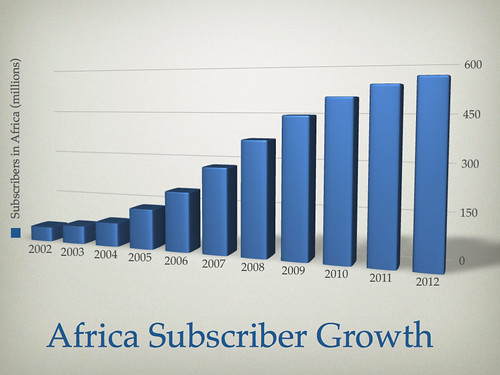
Restricted mobility
A cell phone operator in a remote African village where competition is tough, offers his customers some privacy, by allowing them to try out a cell phone, tethered to a long wire.
Steve Mutinda‘s 3 java applications
Shows an individual using his free time, and trying to create applications that are value added and will make him money. He epitomizes the smart, young entrepreneurs of the continent.
Morris Mbetsa – “Block & Track” auto anti-theft system
Feedelix, dealing with government censorship (Ethiopia)
The Ethiopian government instituted SMS filtering services, which caused some enterprising Ethiopians to launch Feedelix, which is an SMS-like client that supports Amharic characters. The Java application then uses the ability of many phones to transmit data via GPRS through internet protocols to mimic SMS.
Ethioblog – Literacy and/or linguistic challenges
There are challenges to in Africa too, where there are higher rates of non-literacy, or where they don’t speak the language available on their handset. Last year in Ethiopia, some guys got together and developed 200 Amharic language characters that they used to develop a phone book, message and phone settings in Amharic.
Mobile phone equipped bicycles – Bodaphone (Kiwanja), Wheelchair bikes equipped (Ruud Elmendorp)
Phone charging stations/businesses
Most of the time this takes the simple form of a car battery, but you’ll also find enterprising people using other methods (legal and illegal) to run business that only do this.
In Summary
The truth is that there are some very interesting, and surprising, developments coming out of Africa. Every culture modifies use or the device itself to meet local needs – this is no different in Africa, and we’re seeing that evolution happen right before our eyes.
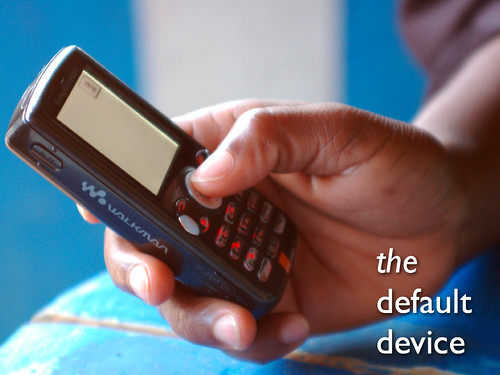
The default device in Africa is the mobile phone.
Here’s one more compelling thought. The challenges brought about by bad governance, poverty, low bandwidth (all the negative things you associate with Africa) also provide an incredible opportunity. The developers who are coming up with solutions in the continent, the ones who are writing software or hacking hardware, are creating for some of the harshest environments and use-cases in the world. If it works in Africa, it will work anywhere.
(Africa News has the video up already – video’d through their mobile phone of course. )


